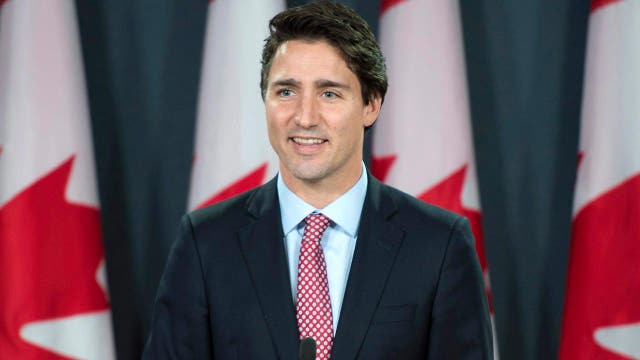What is prompting a global shift to left-leaning governance?
Reaction from the 'Special Report' All-Star panel
This is a rush transcript from "Special Report," October 20, 2015. This copy may not be in its final form and may be updated.
(BEGIN VIDEO CLIP)
JUSTIN TRUDEAU, CANADIAN LIBERAL PARTY LEADER: Canadians have spoken. You want a government with a vision and an agenda for this country that is positive and ambitious and hopeful. Well, my friends, I promise you tonight that I will lead that government.
STEPHEN HARPER, CANADIAN PRIME MINISTER: Well, tonight's result is certainly not the one we had hoped for. The people are never wrong. Canadians have accepted a liberal -- have elected a liberal government, a result we accept without hesitation.
(END VIDEO CLIP)
BRET BAIER, ANCHOR: Well, a change for Canada going left as the election of now incoming prime minister, 43-year-old liberal party, the son of the former Canadian Pierre Trudeau, now the young Trudeau follows in his father's footsteps. And what does that mean for U.S.-Canada relations. We're back with the panel. Laura, I'll tell you, people say Marco Rubio looks young.
(LAUGHTER)
LAURA INGRAHAM , LIFEZETTE.COM: My son's second grade teacher that is 25 looks older than he does.
The pro-business parties throughout Europe, mainstream parties, are all up against the wall. And you see this to some extent happening in England, Britain being able to stave off the left wing push in Europe. In Canada the populist anger went left, went fairly hard left. I think Bernie Sanders is probably smiling last night seeing the results. In France you have the national front. You have the Scottish nationalist party. So where the middle class feels disenfranchised, these more pro-business, traditional parties, if they don't have an answer for them, they are either going to go right or they are going to go left. The trend here is going left.
BAIER: Justin Trudeau is left. Stephen Harper wasn't exactly right wing conservative. I mean, Canada still has universal healthcare and a number of things that under Harper --
CHARLES KRAUTHAMMER, SYNDICATED COLUMNIST: Look, this was not a revolt of the angry in Canada. In Canada, they don't get angry. I lived there. I know it. Maybe in a baseball game they will throw a beer can or a bat from the upper deck. But other than that, they don't get angry.
It was a cyclical election. People are making it as if it was an ethical election. Harper had been in power for 10 years. He won three elections in a row. That never happens in Canada. He'd outlived his welcome. This happens with any government in power for 10 years. And what happens in a parliamentary system, they have the British system first pass the post and every constituency is that it exaggerates the difference in the vote.
The winning liberals got 39.5 percent of the vote, less than 40 percent. The losing conservatives, who were shellacked, got 32 percent of the vote. That's not a huge spread. And I think it's a perfectly normal reflection of a changing mood in the country.
Trudeau is not a Bernie Sanders. He is a centrist. He supports Keystone but he is not going to go to the wall on it. He supports the burning of the oil sands, which the left in his party is against. He has indicated he is going to support the Transpacific Partnership, the trade deal with Asia that the left and the right -- some of the right are up in arms here. He is he a centrist. And liberals have control of the government in Canada almost continually I think for the vast majority of time.
BAIER: Although he also has suggested that he may pull Canadian troops out of the effort against ISIS and out of U.S. coalition partnerships.
KRAUTHAMMER: He is not going to participate in the bombing. But he said last night they pledge to participate in the training of Iraqi forces. So he is in the fight, but he doesn't think he wants to be in the air campaign.
BAIER: What I love, Chuck, was the Canadian broadcasters saying how long and arduous the 11 week campaign was. And then you look at ours at 200 weeks.
CHARLES LANE, WASHINGTON POST: They did have to campaign across the artic, which is tough. But, no, it is remarkable result. But I want to just put in a word here against the idea that this is a big failure of Stephen Harper. Let's not forget there was a time when the conservative party was in single digits in Canada. Stephen Harper rebuilt it and brought it to the point where even when he is losing in a three-way race he is getting 32 percent. He governed that country for 10 years. He made a lot of important changes and reforms. And now he is out because I think, as Charles says, people get tired of the same face after 10 years.
But the moderate, centrist brand of conservatism that he brought to Canada proved an electoral success as it has in England and, who knows, maybe someday in the United States.
BAIER: In 10 seconds, does this make any difference any place else besides Canada?
LANE: Yes. I think it will matter to the Keystone pipeline.
INGRAHAM: I think the middle class around the world is wondering if globalism is going to work for them.
KRAUTHAMMER: Israel has lost its strongest ally on the planet in Stephen Harper and that will be felt.
Content and Programming Copyright 2015 Fox News Network, LLC. ALL RIGHTS RESERVED. Copyright 2015 CQ-Roll Call, Inc. All materials herein are protected by United States copyright law and may not be reproduced, distributed, transmitted, displayed, published or broadcast without the prior written permission of CQ-Roll Call. You may not alter or remove any trademark, copyright or other notice from copies of the content.

